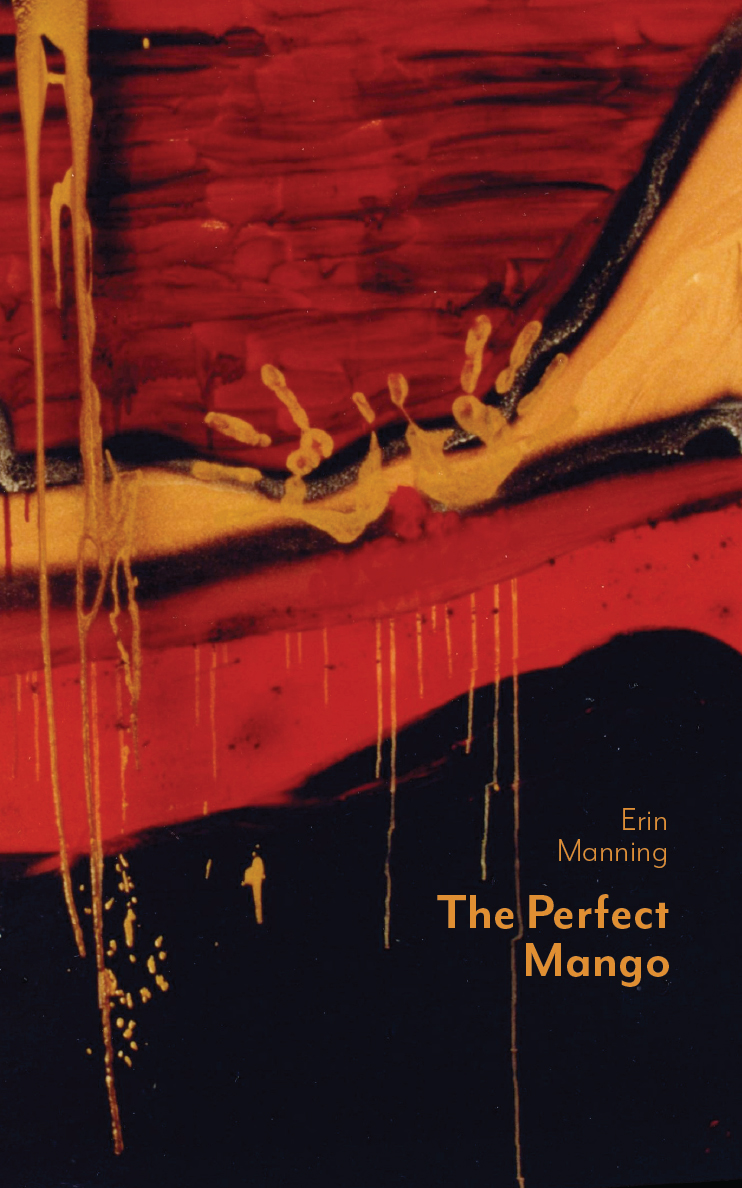Sexual abuse and abuse of all kinds breaks the body. It cleaves experience into a before and after. In my case, though, time was much more crooked. What is an experience that takes you with it? How to speak of acts that multiply, of ways of living that seem to call them forth? How to speak of a life poised for the unraveling?
~ Erin Manning, Preface, The Perfect Mango
The Perfect Mango is a book about the body, about learning to see it as an entity that has no end, something that is never permanently marked by the violence of history, that can swim into a new skin. The sexual trauma that haunts this book is being painted and purged across its pages, and the young woman who refuses to remain caught in the capture of trauma is also learning to feed herself, to become a body-being that will endure in new forms and through new forms of mutual making. I know this girl, for she is many. I love this girl, as I love us all—we misfits whose hurt provokes us to live through other styles and modes of becoming-together.
~ Julietta Singh, Afterward, The Perfect Mango
In 1994, at the age of twenty-five, when the “terrible brokenness that comes with sexual assault” was folded deep within her body and thoughts of suicide were always close by, Erin Manning wrote The Perfect Mango at an almost feverish pitch: nineteen chapters in nineteen days, a sort of self-rescue operation, where writing became a form of making (and feeling) life otherwise. Throughout those nineteen days, and although not able to fully articulate it to herself at the time, Manning wrote her way into a “composition that asks how else life might be lived.” And in the rhythms of that composition, which was also a living, Manning was, and is, able to refuse the category and norm and stillness of “victim” (while still understanding the inheritances of violence) in order to follow instead the more-than-I as well as the joy of the “more-than of experience in the making.”
Twenty-five years later, Manning allows these earlier writings to find their way back into the world, which is also a way of giving “voice to those moments of messy survival” while also asking us, who share in (and help to bear) those moments as readers, to consider “other ways of listening to the urgency that is living.” To (re)publish the book now is to give it a place in the world in a way that honors its force as something that is always beyond anyone’s claim to it, even Manning’s. In this sense, The Perfect Mango invites us, with Manning, to be in excess of ourselves, and also to consider, in Manning’s words, “how to create conditions for living beyond humanism’s fierce belief that we, the privileged, the neurotypicals, the as-yet-unscathed, the able-bodied, hold the key to all perspectives in the theatre of living.” Ultimately, The Perfect Mango and Manning’s reflections on its composition ask us to consider living “in the fierce celebration of a world invented by those modes of life which tear at the colonial, white, neurotypical fabric of life as we know it.”

